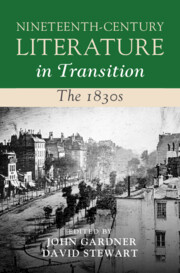Book contents
- Nineteenth-Century Literature in Transition: The 1830s
- Nineteenth-Century Literature in Transition
- Nineteenth-Century Literature in Transition: The 1830s
- Copyright page
- Contents
- Figures
- Contributors
- Acknowledgements
- Introduction
- Chapter 1 On the Eve
- Chapter 2 ‘An Infectious Madness’
- Chapter 3 Augustus Hardin Beaumont, Slavery Apologias, and Popular Radical Literature in the 1830s
- Chapter 4 Patterns of Industry
- Chapter 5 Mother Earth
- Chapter 6 The Polite Fictions of Slavery
- Chapter 7 Suffering, Sentiment, and the Rise of Humanitarian Literature in the 1830s
- Chapter 8 Steam and Iron in the 1830s
- Chapter 9 Lithography and the Comic Image 1825–1840
- Chapter 10 Jorrocks’s Canon
- Chapter 11 Tennyson, Dickens, Poe, Browning, and the Brontës:Blackwood’s Magazine and ‘The Foreheads of a New Generation’
- Chapter 12 Boz in London: The 1830s and the Urban Turn in the English Novel
- Chapter 13 Letitia Elizabeth Landon, Chronicler of the 1830s
- Chapter 14 Railway Imaginary in the 1830s
- Chapter 15 The Emerging Language of Photography
- Afterword
- Index
Chapter 12 - Boz in London: The 1830s and the Urban Turn in the English Novel
Published online by Cambridge University Press: 30 May 2024
- Nineteenth-Century Literature in Transition: The 1830s
- Nineteenth-Century Literature in Transition
- Nineteenth-Century Literature in Transition: The 1830s
- Copyright page
- Contents
- Figures
- Contributors
- Acknowledgements
- Introduction
- Chapter 1 On the Eve
- Chapter 2 ‘An Infectious Madness’
- Chapter 3 Augustus Hardin Beaumont, Slavery Apologias, and Popular Radical Literature in the 1830s
- Chapter 4 Patterns of Industry
- Chapter 5 Mother Earth
- Chapter 6 The Polite Fictions of Slavery
- Chapter 7 Suffering, Sentiment, and the Rise of Humanitarian Literature in the 1830s
- Chapter 8 Steam and Iron in the 1830s
- Chapter 9 Lithography and the Comic Image 1825–1840
- Chapter 10 Jorrocks’s Canon
- Chapter 11 Tennyson, Dickens, Poe, Browning, and the Brontës:Blackwood’s Magazine and ‘The Foreheads of a New Generation’
- Chapter 12 Boz in London: The 1830s and the Urban Turn in the English Novel
- Chapter 13 Letitia Elizabeth Landon, Chronicler of the 1830s
- Chapter 14 Railway Imaginary in the 1830s
- Chapter 15 The Emerging Language of Photography
- Afterword
- Index
Summary
This chapter makes a case for the importance of the 1830s in the history of the British novel. Although unmarked by the publication of novels that enjoyed the longevity of fiction published in the decades before and after, this decade produced a conjunction that was to have a major impact on the future development of the novel form: the emergence, on the one hand, of the young Charles Dickens as a talented new writer and, on the other, of London as a major subject of (predominantly visual) representation. This conjunction, the chapter argues, was to produce a new branch, in Franco Moretti’s sense, on the tree of the British novel. Specifically, the chapter shows how Dickens’s earliest work, Sketches by Boz, already fabricates, in terms of characterisation and its organisation of the social spaces that could potentially underlie plot relations, a London-driven urban aesthetic that would differ from the principles of what, by the 1860s, became consecrated as the canonical British novel.
- Type
- Chapter
- Information
- Nineteenth-Century Literature in Transition: The 1830s , pp. 263 - 283Publisher: Cambridge University PressPrint publication year: 2024

